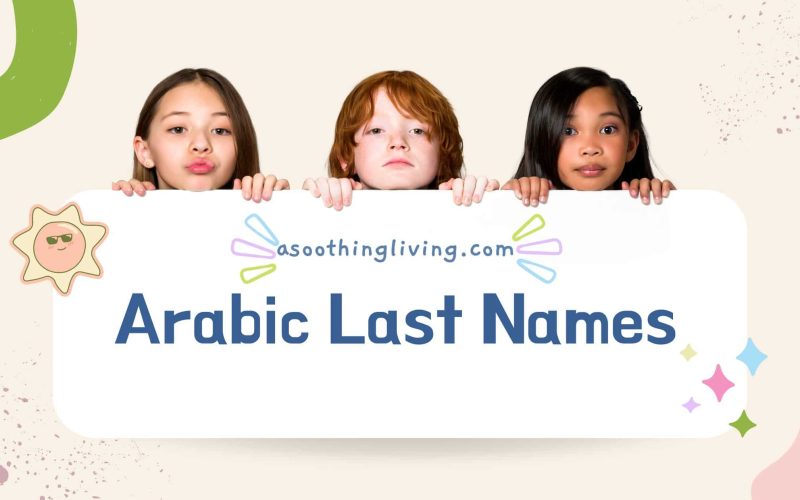We all love Arabic last names and find them beautiful in every way possible. From short to long, from unique to familiar, Arabic last names are full of meaning and history.
It’s as if you can almost hear each character’s story, with some of the most creative spelling systems.
There’s no limit to how creative these Arabic last names can be, making them even more beautiful! It could be hard to narrow down the best Arabic last names.
But that’s where we come in! Here are 28 of the most beautiful Arabic words you will love!
Abadi
Abadi is an Arabic last name that means ancient, old, or first. It can also be a variant of Abu ad-Dahab. People with Arab ancestry sometimes use Abadi as their surname, for example, Syrian/Lebanese athletes Oday Abadi and Dima Abboud.
However, other surnames, such as Ahmedi and Haddad, which mean old, ancient, or first, can be used as last names for Arabic names.
Ali
A beautiful last name that means A hero or that brave person, Ali is originally an Arabic name but has now spread to many other communities.
It can be used as both a masculine and feminine name. In modern times, it is becoming more popular, especially in America.
Nevertheless, the most famous people with an Ali last name are (cousin of prophet Muhammad) and Ali al-Asghar ibn Husayn Zayn al-Abidin (son of Hussein ibn Ali).
These Arabic last names are currently #52 on popularity charts, out of over 7000 characters we collected for you. This makes it about as common as Josh and more common than Liam.
Amin
Amin is a word that carries several different meanings, from peaceful and merciful to trustworthy and generous. Itis also a common first name for men in Muslim cultures. However, it’s used more by those of East African descent than other cultures.
In addition to being a widespread surname, It can also be used as a middle name. Or even as a first name for women.
It is often spelled Amine among Americans with Middle Eastern heritage, and features some very traditional sounds, meaning it’s the perfect Arabic last name for both men and women. And has steadily grown in popularity over recent years.
Asghar
Asghar is a type of last name for people who live in Afghanistan, Iran, Pakistan, Bangladesh, and India. It is an identity based on ethnicity or descent and not on geography. These Arabic last names can be derived from various sources such as Nouns :
In essence, the word Asghar means spear, lance, or arrow. Asghar can also describe a young male child whose face resembles his father’s.
Ayad
In Arabic, Ayad means destiny, another meaning for Ayad is Arabized version of Ed. عيد (‘and) = name of a month in Arabia, including March and April.
Also meaning fountainhead, Ayad is a popular male name amongst Arabs and Muslims worldwide. It’s been one of the famous Arabic last names among Arabs since before the Islamic era.
Although, In Egypt alone, there are more than 26 thousand families with the last name ‘Ayad.’ This family as a single clan has its family tree dating back thousands of years.
That started in Saudi Arabia and passed through Iraq to Egypt. Most of them now live along with other Egyptian clans that joined it through marriage.
Badawi
If you’re trying to spell Badawi, think of it as a two-word last name: bad and awe. That makes terrible a verb and awe an adjective; they act together as an adverb, meaning that Badawi describes your real last name. And not just part of it.
Therefore, Badawi doesn’t count as an absolute last name if you want to get technical. It’s more like an adjective for your last name.
What does that mean? It means that instead of being your real last name, you can give yourself a nickname from it. And use that nickname as your actual surname or last Arabic name.
Bilal
The name Bilal is an excellent example of an Arabic last name. Bilal ibn Rabah was one of two youths chosen by Umayyah ibn Khalaf to carry a basket containing Muhammad’s body after his death when all others were afraid to do so.
In short, Umayyah then enslaved Bilal and forced him to burn incense on idols worshiped by Arabs before Islam. He escaped slavery and ended up in Ta’if (an Arabian city that Muslims later conquered).
The people of Ta’if used to insult him when he came out of his house, but they quickly learned not to offend him because he had such a beautiful voice that everyone loved hearing.
Burhan
Rosa and Garcia are two beautiful Arabic last names. However, do you know which one is originally Arabic? Probably not! But it’s not hard to find out.
Burhan (برهان) is an ancient name that comes from a geographical region known as al-Burhan (البرهان), which currently lies in Saudi Arabia’s southern Asir province near Yemen.
However, It’s believed to have been first used during a time when Arabian tribes were unified under Islamic rule.
And was likely chosen for its religious or geographic significance rather than its sound or other cultural associations. So what does Burhan mean?
Ebeid
is an Arabic last name that means: Servant of God, and it was used by people living in Egypt. It comes from El-Ebid or Al-Ebid, a tribe of Arabs with many branches.
They were descendants of Ishmael, son of Abraham. The famous department of El-Ebid is Jadaan, known as Ebeed, which turned into Ebeid when translated to English, where it became an Arabic last name for Egyptian people.
Darwin
Darwish is an Arabic last name from which several other professions, including poet and historian, are derived.
The name means traveler or traveler, but it’s more common to use as a title for someone who is known for writing poetry. At the same time, it would be no surprise to see an artist or performer with these Arabic last names.
Also, many other professions have adopted it to show their love of Arabic culture and learning. For example, people whose careers deal with animals or nature may choose Darwish. Because they want others to know where their inspiration comes from.
Fadel
Fadel is an ancient Arabic last name for boys and girls, meaning Felicity—derived from Fadl and Fadi. Fadel’s meaning is Felicity, and it is an Old Arabic name.
Nonetheless, famous Muslim personalities named Fadel are Salman Fadel (American-Iraqi Medical Doctor). Yara Jallal Fadeel, Salah Abdul-Fattah al-Jaburi, etc.
Faez
Faez is an Arabic last name and surname. The word has two possible meanings derived from its root word, fa-ay’za. Fa-ay’za translates to love, which means Faez’s first meaning is the lover.
Its second meaning comes from fizzing (reward or compensation), which can also be interpreted as deserving of reward.
So, many Arab and Islamic families have adopted Faez as their Arabic last name. Because they believe they deserve of reward.
Faizan
Faizan is an Arabic name for boys and girls. It and Faiza are also used as girl names. The name Faizan is a variant of Faisal (Arabic). Meaning: victory, zeal.
On the other hand, similar baby Arabic last names are Fahad, Fahd, Faraz, Faris, Fawad, Iffat, Isra’il, Junaid, and Zainab. In Muslim countries, its popularity as a baby boy’s name remains constant.
Farsi
Farsi is an Arabic term that describes someone from a specific part of Iran. It can also tell someone who speaks Farsi as their native language. In terms of name origins, Farsi-based last names are certainly not uncommon.
Notably, Farsi and other words like Arabic are used as last names, mainly if you come from one of these regions or speak a related language.
Wide varieties exist, including Nafis and Abbosh, so finding your family heritage shouldn’t be too tricky! Still, looking for your last name inspiration?
Learn more about how our talented design team goes about creating logos and business cards that reflect unique personalities on your preferable Arabic last names!
Maamoun
Some Arab families in Egypt use a surname derived from an old Egyptian name. The name Maamoun comes from Magnus, which means lion. However, sometimes, Maamoun has used as Arabic last names for married women.
One example of a woman who uses Maamoun as her last name is Suhair al-Maamoun. Also spelled Suhayr el-Mamon), an Egyptian author of children’s books.
Mohammed
Even though Mohammed is an Arabic name, it is trendy in many countries across Asia. According to Unesco, there are 57 countries where Mohammed is one of its most common names.
There are as many people with Mohammed as a first name in China alone (roughly 66 million) as in Turkey (approximately 65 million).
This is to say, Islam was brought to China by Arab traders from the 7th through 13th centuries. It’s also a popular Arabic last name throughout South East Asia.
In Indonesia alone, it is one of its top 100 most common surnames. A similar trend can be found in Malaysia, where it is listed at #91 on their list of common surnames.
Qadir
Qadir is a male given name that means mighty. It can also be used as a surname. According to Islamic tradition, it was one of two names of Al-Muṭṭalib ibn Hāshim, paternal uncle of prophet Muhammad. He gave his name to Banu Qadir, a branch of Bani Kinana tribe in Mecca.
Moreover, these Arabic last names have been adopted by many people throughout history, including:
The following are notable people with the last name Qadir:
- al-Jaza’iri (1928–1999), Tunisian politician
- Khan (1932–2011), Pakistani cricketer.
- Hossain (born 1936), Bangladeshi politician.
- Mohammad Asif Qadri (born 1973), a Pakistani cleric
Osman
In Arabic, Osman means lion but is also a widespread given name in Muslim countries like Turkey. It may seem obvious that one of your child’s names should be Arabic.
However, please do not choose an Arabic last name because it’s different. You don’t want your child stuck with a name that he feels is weird or embarrassing as he gets older.
Instead, choose something you love for its meaning or sound rather than simply for its uniqueness factor.
This way, your little boy can enjoy his name now and when he grows up! Could you keep it simple? The last thing you want to do is burden your child with a new language.
Noor
Arabic last names for boys are rare in China. They’re common in other Middle Eastern countries but have yet to catch on among Chinese parents.
One Arabic name is Noor, which means light in Arabic, and has become a common last name for boys in many Arab countries.
Regardless, If you’re looking for an Arabic name with a meaning that sounds good in both English and Mandarin, try Noor—not many people will be familiar with it, but it’s uncommon enough that your child could make it his own.
Najjar
Najjar is a surname; notable people with the surname include Abdul Nasser Najjar (born 1951), Palestinian politician and mayor of Jenin since 2006. Former member of parliament in 2003 and 2006;
Ahmad bin Laden (1829–1908), Saudi Arabian businessman and father of Osama bin Laden.
Nevertheless, Najm ad-Dīn al-Misrī (1101–1166), Egyptian historian; Alaa Adel Najjar (born 1994), Egyptian footballer.
Zakaria Ahmad Hassan Najjar (1989–2009). Palestinian militant was shot dead by Israeli forces after murdering three Israelis in Tel Aviv on 29 August 2009. He was allegedly affiliated with Hamas.
Najm
Najm (نجم) is an Arabic last name that means star. It’s used as a standalone Arabic previous name; it is mainly found in Arab states of the Persian Gulf. The literal translation is ‘lamp.’
More so, In English, it can be written Najm or Nagem. Najm al-Dīn Abū ’l-‘Abbās Ahmad ibn Muḥammad ibn ‘Uthmān ibn Ibrāhīm al-Quṭrubī al-Shafiyyah was a Persian astronomer. Who lived in Shiraz, Iran, from around 1566–1642.
Sader
Some Arabised form of Greek Soteros, derived from Soteria, meaning ‘salvation.’ Another possibility is that it is a Latinized form of older Arabic last names meaning ‘redhead’ (sudar). Al-Suddar was one of two epithets for Sayyidina Abu Bakr, who became the first Caliph.
In particular, the other was al-Khulafa (The Viceroy). Neither of these names appears in Arabic literature before their mention in tasawwuf (Islamic mysticism) in connection with Abu Bakr. No such Arabic last names existed or had been used in daily life.
Taleb
it is most commonly written as Talab (the pronunciation in Arabic), but also as T’alb, Thalab, or Tahalb. Taleb is an alternative transcription. In China, many Muslims are Hui people who speak Mandarin Chinese, and possibly elsewhere among other speakers of Standard Chinese.
Also, in English, no such distinctions exist between romanizations that do not distinguish voicing in vowels (hence, use t to represent /t/). It is often romanized as Thālạp.
Sultan
If you are looking for something Arabic, then Sultan is a great choice. The meaning of Sultan is to reign in Arabic. Sultans are usually kings who have absolute power over their kingdom. Your child will love this name throughout childhood and even as he grows older!
Nonetheless, It’s also an unusual name that will make him stand out from other kids around him. It’s a popular first name and one of the most used last names among people from Middle Eastern countries like Turkey, Egypt, Iraq, etc.
Also, due to its beauty and elegance, it has become quite popular across many cultures. Kids with such exotic first names tend to be more popular among others at school or the workplace.
Or any other social gatherings they attend regularly! You can choose either gender while naming your son with these beautiful Arabic last names that suit every personality type well!
Wahed
Wahid is an Arabic first name. It is pronounced Wah-head. It means adequate, satisfying, and sufficient; Wahid also has connotations of holiness and righteousness.
Learn more about Wahid in our Baby Name Finder or discover more unique baby names with meanings in our comprehensive Baby Name Directory!
Though, the word wahed means one in Arabic. It is a common surname in China among Muslims and Uyghurs, who live mainly in Xinjiang Province (Chinese: Sinkiang).
For example, four people on Weibo (the Twitter of China) with that Arabic last names. The top two are listed below:
Zaman
Zaman means time in Arabic, and this surname also means day in Urdu and Hindi. Another interesting fact about Zaman is that it has a great deal of popularity across different countries, including India, Pakistan, Afghanistan, and Iran. Turkey and some areas of Russia.
Nonetheless, Zaman is a ubiquitous Arabic last name in China. A study on how popular Zaman was in 1990 revealed more than 20 million individuals. Who went by that surname or its variations.
Yasin
Yasin is a common Arabic last name, and Its usage dates back to the 7th century. When Arab traders established contact with China. Today, Yasin is an Arabic name that means good news or gospel.
Variants of Yasin include Yassin, Yaseen, Yaseen, Yusun, and other spellings of Arabic last names. Besides its use as a last name in Arab countries such as Egypt and Yemen. It’s also commonly used among Pakistani Muslims.
Abdallah
Abdallah is an Arabic name meaning Servant of God, and this is an exciting choice for a boy’s Arabic last name. Because it combines one of Christianity’s most common given names with an Islamic name meaning servant of God. In Islam, Abdallah is also used as a given name.
However, many Muslim parents choose not to use it as a first name because they believe it should only be reserved for prophets in Islam.
Such as Moses and Jesus (mentioned in their entire terms). A more popular choice among Muslim parents is Abdullah or Abdur Rahman, the slave or servant of God.
Meanwhile, Abdullah could be an alternative spelling for Abdallah that does not have religious connotations. Other variants include Abdulah, Abdellah, Abdulrahman, and Abdulla.
Ali
Ali was borne by several early Islamic leaders, including Muhammad’s son-in-law. It ibn Abi Talib (who took it in honor of his adopted father) is a reasonably common Arabic first name.
It can be spelled with three Ls, two Ls, or one (which is correct in Arabic but not in English). The name means high, exalted, or the most elevated.
However, Ali also made it onto Nameberry’s 2015 list of top Arabic last names for baby boys.) In China, it carries connotations that go back to pre-Islamic times.
It’s associated with legends about a beautiful third-century concubine, Yang Yuhuan, who allegedly committed suicide when her husband rejected her.
Conclusion
Many Westerners assume that Arabic family names come from a specific culture or religion. But they’re no different than last names in other cultures.
The only difference is that some are written slightly differently to conform to specific grammar rules for proper nouns.
There is no direct correlation between an Arabic last name and religious or cultural background. It’s all about how you choose to write it.
For example, Hijazi would be considered Islamic because it is derived from Hajj, but many other families exist. Who uses Hijazi as their last name because it was passed down from generation to generation within their family.








